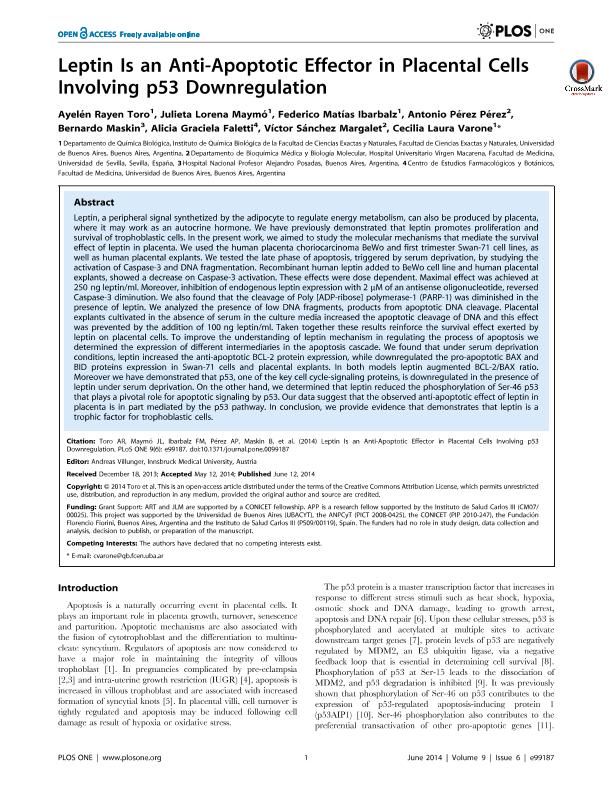Artículo
Leptin is an anti-apoptotic effector in placental cells involving p53 downregulation
Toro, Ayelen Rayen ; Maymo, Julieta Lorena
; Maymo, Julieta Lorena ; Ibarbalz, Federico Matias
; Ibarbalz, Federico Matias ; Pérez Pérez, Antonio; Maskin, Bernardo; Faletti, Alicia Graciela
; Pérez Pérez, Antonio; Maskin, Bernardo; Faletti, Alicia Graciela ; Sánchez Margalet, Víctor; Varone, Cecilia Laura
; Sánchez Margalet, Víctor; Varone, Cecilia Laura
 ; Maymo, Julieta Lorena
; Maymo, Julieta Lorena ; Ibarbalz, Federico Matias
; Ibarbalz, Federico Matias ; Pérez Pérez, Antonio; Maskin, Bernardo; Faletti, Alicia Graciela
; Pérez Pérez, Antonio; Maskin, Bernardo; Faletti, Alicia Graciela ; Sánchez Margalet, Víctor; Varone, Cecilia Laura
; Sánchez Margalet, Víctor; Varone, Cecilia Laura
Fecha de publicación:
06/2014
Editorial:
Public Library of Science
Revista:
Plos One
ISSN:
1932-6203
Idioma:
Inglés
Tipo de recurso:
Artículo publicado
Clasificación temática:
Resumen
Leptin, a peripheral signal synthetized by the adipocyte to regulate energy metabolism, can also be produced by placenta, where it may work as an autocrine hormone. We have previously demonstrated that leptin promotes proliferation and survival of trophoblastic cells. In the present work, we aimed to study the molecular mechanisms that mediate the survival effect of leptin in placenta. We used the human placenta choriocarcinoma BeWo and first trimester Swan-71 cell lines, as well as human placental explants. We tested the late phase of apoptosis, triggered by serum deprivation, by studying the activation of Caspase-3 and DNA fragmentation. Recombinant human leptin added to BeWo cell line and human placental explants, showed a decrease on Caspase-3 activation. These effects were dose dependent. Maximal effect was achieved at 250 ng leptin/ml. Moreover, inhibition of endogenous leptin expression with 2 µM of an antisense oligonucleotide, reversed Caspase-3 diminution. We also found that the cleavage of Poly [ADP-ribose] polymerase-1 (PARP-1) was diminished in the presence of leptin. We analyzed the presence of low DNA fragments, products from apoptotic DNA cleavage. Placental explants cultivated in the absence of serum in the culture media increased the apoptotic cleavage of DNA and this effect was prevented by the addition of 100 ng leptin/ml. Taken together these results reinforce the survival effect exerted by leptin on placental cells. To improve the understanding of leptin mechanism in regulating the process of apoptosis we determined the expression of different intermediaries in the apoptosis cascade. We found that under serum deprivation conditions, leptin increased the anti-apoptotic BCL-2 protein expression, while downregulated the pro-apoptotic BAX and BID proteins expression in Swan-71 cells and placental explants. In both models leptin augmented BCL-2/BAX ratio. Moreover we have demonstrated that p53, one of the key cell cycle-signaling proteins, is downregulated in the presence of leptin under serum deprivation. On the other hand, we determined that leptin reduced the phosphorylation of Ser-46 p53 that plays a pivotal role for apoptotic signaling by p53. Our data suggest that the observed anti-apoptotic effect of leptin in placenta is in part mediated by the p53 pathway. In conclusion, we provide evidence that demonstrates that leptin is a trophic factor for trophoblastic cells.
Palabras clave:
Leptina
,
Placenta
,
Apoptosis
,
P53
Archivos asociados
Licencia
Identificadores
Colecciones
Articulos(CEFYBO)
Articulos de CENTRO DE ESTUDIOS FARMACOLOGICOS Y BOTANICOS
Articulos de CENTRO DE ESTUDIOS FARMACOLOGICOS Y BOTANICOS
Citación
Toro, Ayelen Rayen; Maymo, Julieta Lorena; Ibarbalz, Federico Matias; Pérez Pérez, Antonio; Maskin, Bernardo; et al.; Leptin is an anti-apoptotic effector in placental cells involving p53 downregulation; Public Library of Science; Plos One; 9; 6; 6-2014; e99187
Compartir
Altmétricas



